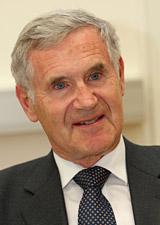Efraim Racker

What Cells Tell Us About Life On Earth
About the speaker

Gottfried Schatz
The Biozentrum, University of Basel, Switzerland
Dr. Schatz was born on August 18, 1936 in Strem, an Austrian village close to the Hungarian border. He grew up in Graz, the second-largest City of Austria, but spent the year 1952 as an American Field Service-sponsored high school student in Rochester, NY. After receiving his Ph D. in Chemistry from the University of Graz in 1961, Dr. Schatz joined the Biochemistry Department of the University of Vienna where he began his ·studies on the biogenesis of mitochondria. He then worked as a postdoctoral fellow with Ef Racker at the Public Health Research Institute in New York City from 1964 to 1966, studying the mechanism of oxidative phosphorylation. This was the beginning of a life-long friendship with Ef. After a brief interlude back in Vienna, Dr. Schatz emigrated to the USA in 1968 to join the Section of Biochemistry, Molecular and Cell Biology here at Cornell, where he became a Full Professor in 1973. Dr. Schatz then moved to the University of Basel (Switzerland), where he took on the challenge of building a new scientific institute (the Biozentrum). He is currently the director of what has come to· be recognized as one of the leading research institutes in Europe.
Dr. Schatz is an internationally recognized leader in biochemistry and cell biology. His laboratory has made a number of fundamental contributions in our understanding of how cells generate energy for various reactions, and in particular, how the mitochondria of cells synthesize and import proteins. He is a foreign member of the American Academy of Arts and Sciences, the US National Academy of Sciences, the Austrian Academy of Sciences, and the Royal Swedish Academy of Sciences. Dr. Schatz has won a number of prestigious awards including the Sir Hans Krebs Medal, the Louis Jeantet Prize for Medicine, the Lynen Medal, and the Gairdner Award. He also has served on a number of committees including his role as Secretary General of the European Molecular Biology Organization (EMBO).
He and his Danish wife Merete have three children.